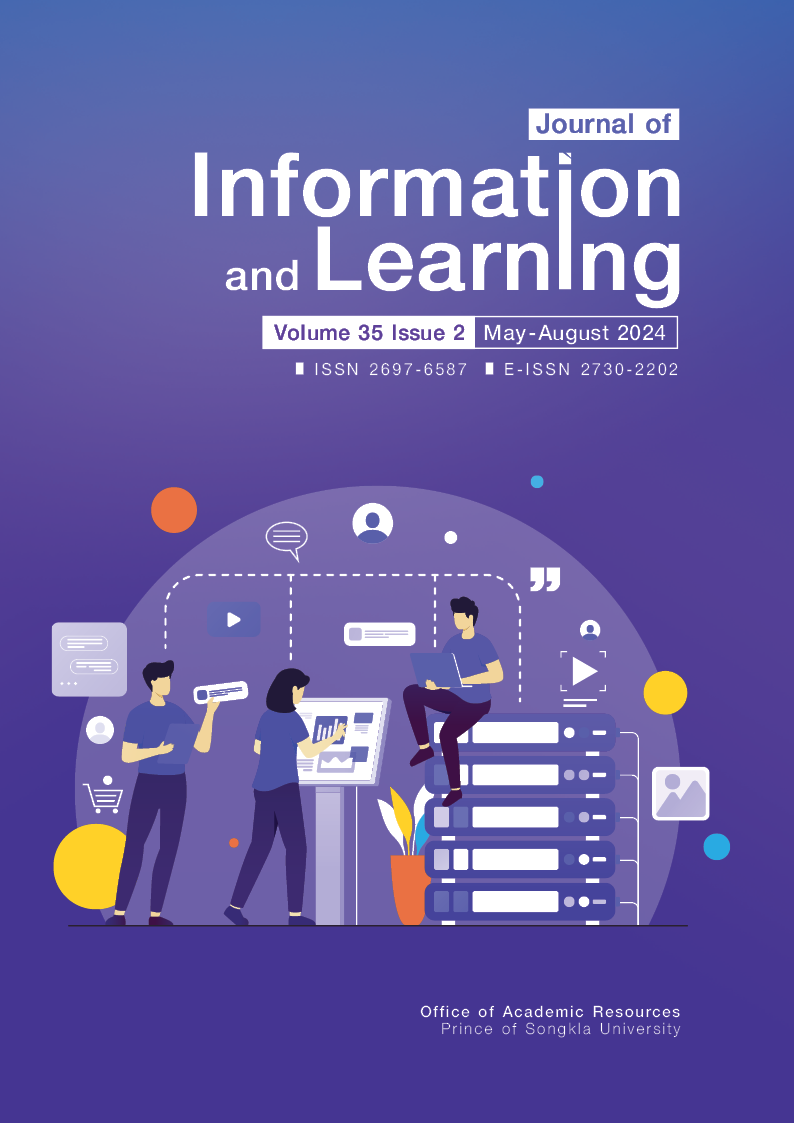Analyzing the Evolution of Personal Knowledge Management and its Integration With Artificial Intelligence Technology: A Bibliometric Analysis
Main Article Content
Abstract
This research aims to present the knowledge structure, directions, and trends of research in personal knowledge management (PKM) and its integration with artificial intelligence (AI). The study employed bibliometric analysis of journal articles, proceedings, book chapters, and books on PKM and AI integration published in the Scopus database between 1988 and February 2024. Keyword analysis and co-word analysis were utilized to interpret the data. The findings reveal three main concepts: knowledge management, artificial intelligence, and the science and technologies involved in integrating PKM and AI. The knowledge structure of PKM and AI research is divided into five clusters: knowledge worker development, knowledge sharing, artificial intelligence, knowledge management systems, and information management. The research also identifies AI as a promising area for supporting PKM, particularly in knowledge acquisition, sharing and transfer.
Article Details

This work is licensed under a Creative Commons Attribution-NonCommercial-NoDerivatives 4.0 International License.
The Journal of Information and Learning is operated by the Office of Academic Resources, Prince of Songkla University. All articles published in the journal are protected by Thailand copyright law. This copyright covers the exclusive rights to share, reproduce and distribute the article, including in electronic forms, reprints, translations, photographic reproductions, or similar. Authors own copyrights in the works they have created as well as the Office of Academic Resources. The Journal reserves the right to edit the language of papers accepted for publication for clarity and correctness, as well as to make formal changes to ensure compliance with the journal's guidelines. All authors must take public responsibility for the content of their paper.
References
Alavi, M., & Leidner, D. E. (2001). Review: Knowledge management and knowledge management systems: Conceptual foundations and research issues. MIS Quarterly, 25(1), 107-133. https://doi.org/10.2307/3250961
Alavi, M., Leidner, D. E., & Mousavi, R. (2024). A knowledge management perspective of generative artificial intelligence. Journal of the Association for Information Systems, 25(1), 1-12. https://doi.org/10.17705/1jais.00859
Avancini, H., & Straccia, U. (2005). User recommendation for collaborative and personalised digital archives. International Journal of Web Based Communities, 1(2), 163-175. https://doi.org/10.1504/IJWBC.2005.006061
Cheong, R. K. F., & Tsui, E. (2010). The roles and values of personal knowledge management: An exploratory study. VINE, 40(2), 204-227. https://doi.org/10.1108/03055721011050686
Chowdhury, S., Budhwar, P., Dey, P.K., Joel-Edgar, S., & Abadie, A. (2022). AI-employee collaboration and business performance: Integrating knowledge-based view, socio-technical systems and organisational socialisation framework. Journal of Business Research, 144, 31-49. https://doi.org/10.1016/j.jbusres.2022.01.069
Donthu, N., Kumar, S., Mukherjee, D., Pandey, N., & Lim, W. M. (2021). How to conduct a bibliometric analysis: An overview and guidelines. Journal of Business Research, 133, 285-296. https://doi.org/10.1016/j.jbusres.2021.04.070
Gasik, S. (2011). A model of project knowledge management. Project Management Journal, 42(3), 23-44. https://doi.org/10.1002/pmj.20239
Google DeepMind. (n.d.). Technology AlphaGo. https://deepmind.google/technologies/alphago
Gorman, G. E., & Pauleen, D. J. (2011). The nature and value of personal knowledge management. Exploring the linkages between personal knowledge management and organizational learning. In D. J. Pauleen, & G. E. Gorman (Eds.), Personal knowledge management: Individual, organizational and social perspectives (pp. 1-15). Routledge. https://doi.org/10.4324/9781315600154
Heaven, W. D. (2020). OpenAI’s new language generator GPT-3 is shockingly good—and completely mindless. MIT Technology Review. https://www.technologyreview.com/2020/07/20/1005454/openai-machine-learning-language-generator-gpt-3-nlp
Hu, X., Tian, Y., Nagato, K., Nakao, M., & Liu, A. (2023). Opportunities and challenges of ChatGPT for design knowledge management. Procedia CIRP, 119, 21-28. https://doi.org/10.1016/j.procir.2023.05.001
Jarrahi, M. H., Reynolds, R., & Eshraghi, A. (2021). Personal knowledge management and enactment of personal knowledge infrastructures as shadow IT. Information and Learning Sciences, 122(1/2), 17-44. https://doi.org/10.1108/ILS-11-2019-0120
Khasseh, A. A., Soheili, F., Moghaddam, H. S., & Chelak, A. M. (2017). Intellectual structure of knowledge in iMetrics: A co-word analysis. Information Processing and Management, 53(3), 705-720. https://doi.org/10.1016/j.ipm.2017.02.001
López-Quintero, J. F., Cueva Lovelle, J. M., González Crespo, R., & García-Díaz, V. (2018). A personal knowledge management metamodel based on semantic analysis and social information. Soft Computing, 22(6), 1845-1854. https://doi.org/10.1007/s00500-016-2437-y
Manesh, M. F., Pellegrini, M. M., Marzi, G., & Dabic, M. (2021). Knowledge management in the fourth industrial revolution: Mapping the literature and sng future avenues. IEEE Transactions on Engineering Management, 68(1), 289-300. https://doi.org/10.1109/TEM.2019.2963489
Nazeer, S., Sumbal, M.S., Liu, G., Munir, H., & Tsui, E. (2023). The next big thing: Role of ChatGPT in personal knowledge management challenges and opportunities for knowledge workers across diverse disciplines. Global Knowledge, Memory and Communication. https://doi.org/10.1108/GKMC-07-2023-0246
Nemati, H. R., Steiger, D. M., Iyer, L. S., & Herschel, R. T. (2002). Knowledge warehouse: An architectural integration of knowledge management, decision support, artificial intelligence and data warehousing. Decision Support Systems, 33(2), 143-161. https://doi.org/10.1016/S0167-9236(01)00141-5
Nonaka, I., & Takeuchi, H. (1995). The knowledge creating company. Oxford University.
Parthiban, K., Pandey, D., & Pandey, B.K. (2021). Impact of SARS-CoV-2 in online education, predicting and contrasting mental stress of young students: A machine learning approach. Augmented Human Research, 6, Article 10. https://doi.org/10.1007/s41133-021-00048-0
Razmerita, L., Brun, A., & Nabeth, T. (2022). Collaboration in the machine age: Trustworthy human-AI collaboration. In M. Virvou, G.A. Tsihrintzis, & L.C. Jain (Eds.), Advances in Selected artificial intelligence areas: Learning and analytics in intelligent systems (Vol. 24, pp. 333-356). Springer. https://doi.org/10.1007/978-3-030-93052-3_14
Sumbal, M. S., & Amber, Q. (2024). ChatGPT: A game changer for knowledge management in organizations. Kybernetes. https://doi.org/10.1108/K-06-2023-1126
Uta, M., Felfernig, A., Le, V., Tran, T.N.T., Garber, D., Lubos, S., & Burgstaller, T. (2024). Knowledge-based recommender systems: Overview and research directions. Frontiers in Big Data, 7, Article 1304439. https://doi.org/10.3389/fdata.2024.1304439
Wang, X., Lu, J., Song, Z., Zhou, Y., Liu, T., & Zhang, D. (2022). From past to future: Bibliometric analysis of global research productivity on nomogram. Frontiers in Public Health, 10, Article 997713. https://doi.org/10.3389/fpubh.2022.997713
Wiig, K. M. (2011). The importance of personal knowledge management in the knowledge society. In D. J. Pauleen, & G. E., Gorman (Eds.), Personal knowledge management: Individual, organizational and social perspectives (pp. 228-262). Routledge. https://doi.org/10.4324/9781315600154


